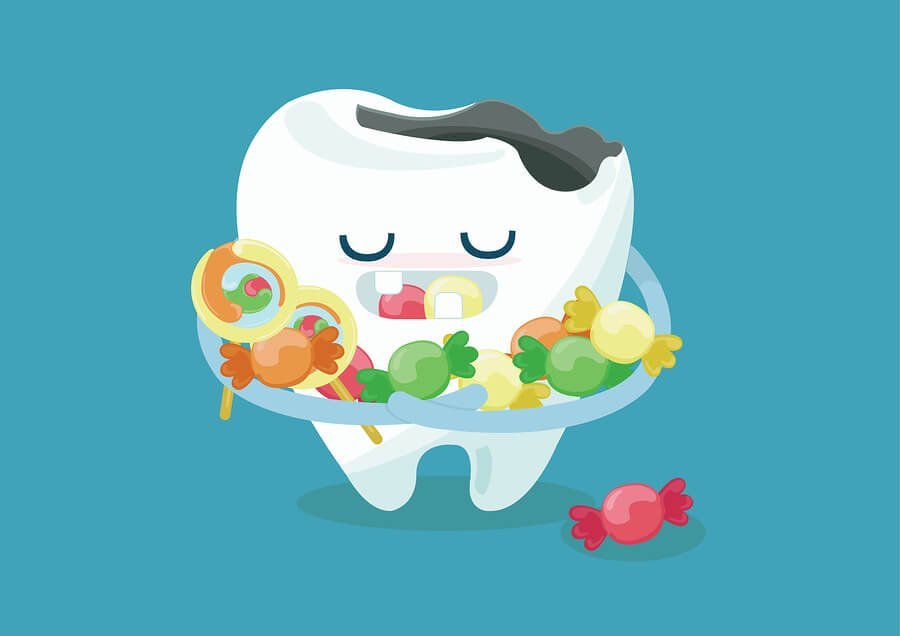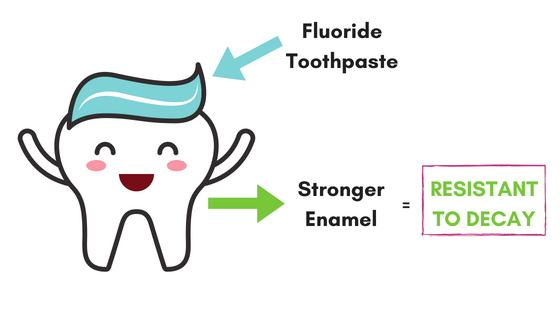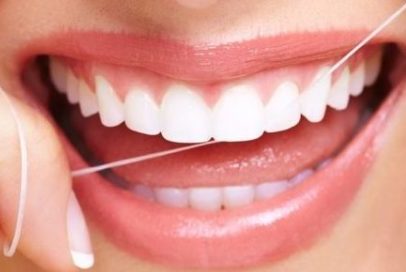How Should I Care for my Baby’s Teeth?
- You should be brushing your babies teeth as soon as the first tooth starts to come out. This can initially be difficult but it is important to get your baby used to this as part of their daily routine.
- Brushing should be for 2 minutes twice a day with toothpaste that has at least 1000ppm of fluoride
- Fluoride is essential as this prevents tooth decay. The amount of fluoride that should be used will be dependent on your baby’s age. For exact doses, please refer to the ‘what toothpaste should I use for my baby’s teeth’ section. If you want to read more about fluoride click here
- One method of brushing their teeth is to sit your baby on your lap with their head on your chest
- Try brushing your teeth in front of your baby to help set an example and act as a role model
- Take your child to the dentist for check ups regularly
- Avoid using dummies as these can lead to an open bite – this is where the dummy creates a space between the top and bottom front teeth, so they don’t touch when biting.
- Diet and oral hygiene are both very important factors in ensuring healthy teeth
Please also watch this instructional video by the NHS.
Diet Advice for Healthy Teeth
- Sugar causes tooth decay so this should be avoided in both foods and drinks
- Milk and water is recommended
- Using bottles to give sugary drinks including juices can increase child decay
- Bottles should only be used for breast milk or formula milk
- From 6 months you should use free flowing cups
- Try to opt for medicines with no sugar in
- For prescribed medications with sugar, discuss alternatives with your baby’s GP
- You should ensure that other family members or anyone who takes care of the baby is aware of these recommendations
What Toothpaste Should I Use for my Baby’s Teeth as they Grow?
As soon as your baby’s teeth start coming through, you should start brushing them. You should use a baby toothbrush and a smear of toothpaste containing at least 1,000ppm fluoride. For children over the age of 3, a pea-sized amount of toothpaste containing 1,350-1,500ppm should be used. Try to ensure your child spits out the toothpaste instead of rinsing, as this will maximise the effect of fluoride. Equally, it’s important to ensure that your baby is not swallowing the toothpaste. Fluoride is very important as it helps prevent tooth decay.
When Should I Take my Baby to the Dentist?
We usually advise parents to bring their babies to the practice around 6 months in age or when the first teeth has come through. We can arrange an appointment at the same time as your own for convenience. NHS Dental care is free for all who are 17 and under. Taking your baby to the dentist at a young age is recommended as not only will the dentist be able to identify any oral health issues at an early stage, but the child will become used to the dental setting. Your baby should be brought to the dentist at least on a 6 monthly basis but may be brought more regularly, if your dentist has any particular concerns about their oral health.
What to Expect at the First Visit with a Dentist
The aim of the first visit to a dentist is to acclimatise them to the new environment as best as possible. The dentist will check your baby’s teeth and gum health if possible and provide you with diet and hygiene advice. They will also ensure that your child’s teeth are developing properly and answer any queries you may have.
Further Information
The NHS provides free official guidance on caring for your baby’s teeth. You can view this here.
There is also helpful information related to baby’s teething symptoms here.
Frequently Asked Questions
-
Do Baby's Teeth Need Cleaning
Yes, as soon as a tooth develops, plaque can begin to build up on the surface which leads to decay. Baby teeth require care when cleaning as they are delicate. Do not worry if you do not manage to brush much at first, it is important that your baby gets used to the feeling of brushing in order to establish a good care routine.
-
My Baby Does Not Like Having Their Teeth Brushed
Some babies will find brushing uncomfortable, it is important to try and make the experience fun where possible to do so. Try to make the brushing into a game or song, and try to stay calm when attempting to brush their teeth, as your mood will impact your baby’s.
For small children, there tends to be success when parents pretend to brush their own teeth, as children enjoy mimicking this behaviour.
If you require further advice on this please contact your dentist.
-
My Baby Doesn't Have Teeth Yet
If your child does not have teeth by 12 months it is advised to take them to a dentist. Babies can have delayed teeth due to many reasons such as being premature, having a low birth weight or due to genetics.
A dentist will be able to investigate the cause further and provide the correct advice, as every baby is unique.
If you have any questions related to your baby’s teeth, please feel free to get in touch.
The Vallance Dental Centre is located in Manchester, UK.


